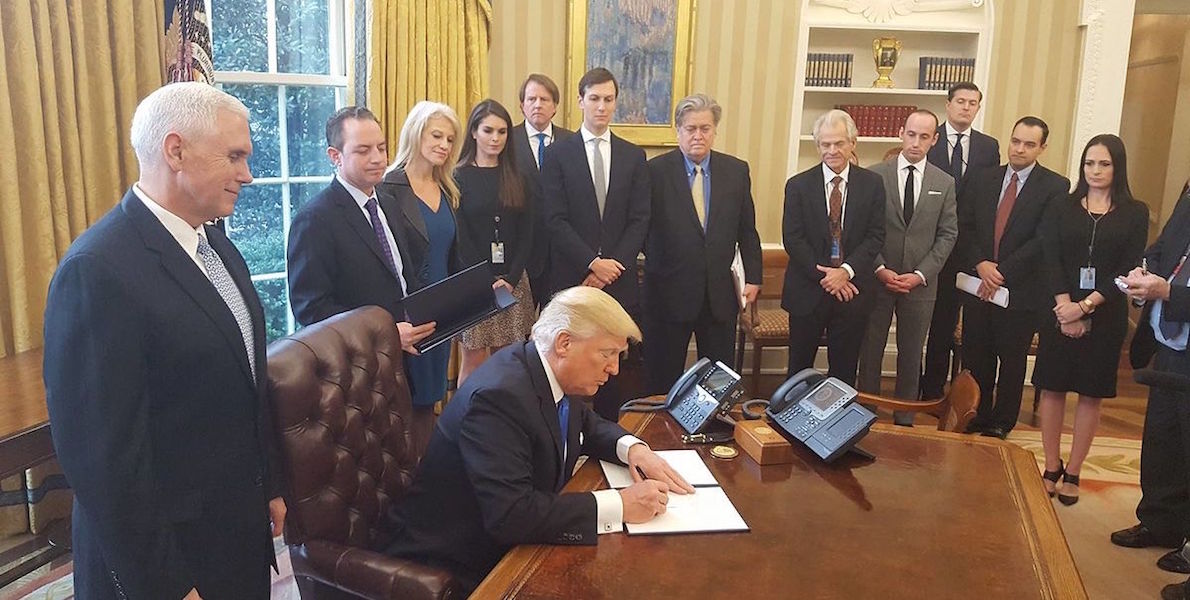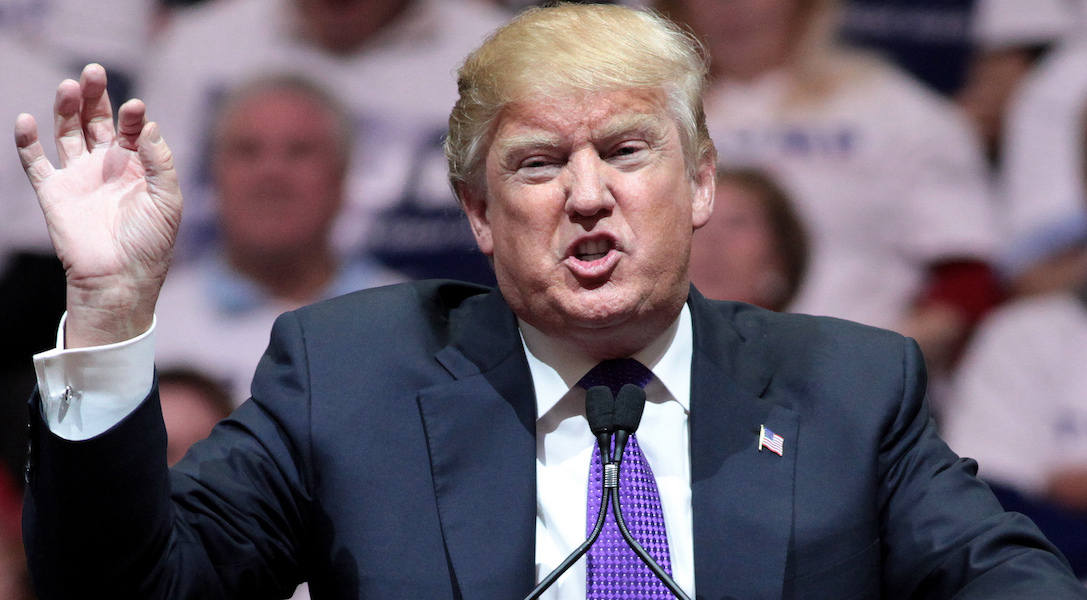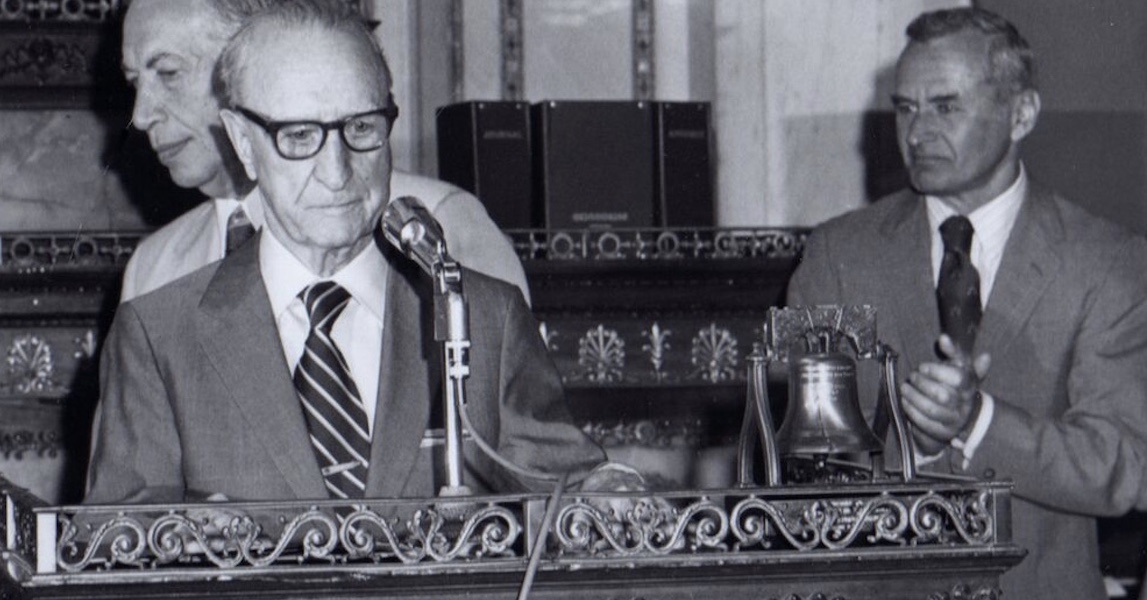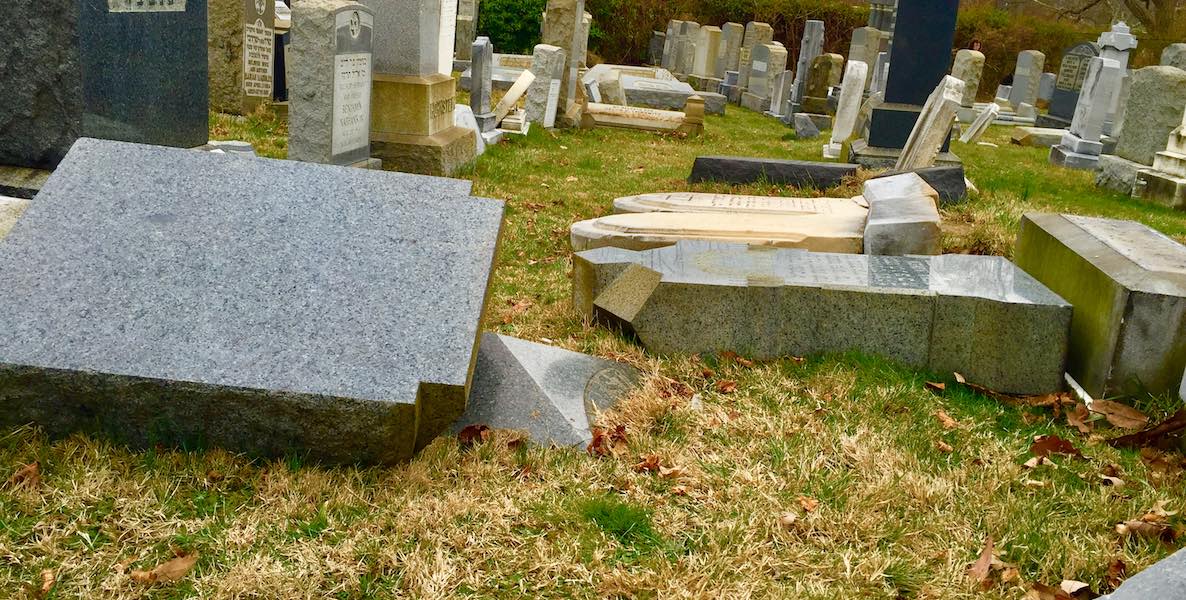I caught up with Attorney General Josh Shapiro Wednesday morning, and he still seemed mystified at the byplay between him and President Trump that had made national news the day before. What do you think the President meant? I asked Shapiro, who sighed in return. “Let me be really clear,” he said. “I still have no idea.”
Shapiro was in Washington, D.C., for a meeting of the National Association of Attorneys General when the group found out, on Monday night, that they’d been invited to the White House the next morning to meet with Trump.
Some of Shapiro’s more partisan Democratic colleagues grumbled that they wouldn’t attend. “I went because I thought the office of the president deserved that respect,” he said. “Besides, I thought the President should hear what Attorneys General think, and we should hear him out.”
So it was that roughly 40 Attorneys General gathered in the White House’s East Room. They heard five minutes of remarks from the president before he entertained questions. Shapiro raised his hand.
“Mr. President, I’m Josh Shapiro from Pennsylvania,” he said, before listing the litany of recent examples of hate speech, threats and intimidation aimed at Jews: The desecration of headstones at Philadelphia and St. Louis cemeteries, the evacuation of a local Jewish Day School, the bomb threats being called in to Jewish Community Centers around the country. “How can state and federal government partner to deal with these threats and hate speech?” he asked.
The President was suggesting that either Jews or Democrats were desecrating cemeteries and calling in bomb threats to make him look bad. Once again, our narcissist-in-chief had punted on a critical question of leadership and made it all about him.
Let’s let Shapiro take it from here: “The President responded by saying three things,” he says. “First, that such acts are reprehensible. Second, that he’d speak about these acts later that night in his speech to a joint session of Congress. And, third, he said, ‘But the reverse could be true,’ and that we ‘have to be careful, it could be a reverse to make others look bad.’ He must have used the word ‘reverse’ three times. When we were on the portico, walking from the East Room to the Oval Office, a number of AGs—Democrat and Republican—came up to me. ‘What is he talking about?’ I truly don’t know.”
Seems to me, if Shapiro’s account is accurate, and no one has come forward to say it isn’t, there can be only one conclusion: The President was suggesting that either Jews or Democrats were desecrating cemeteries and calling in bomb threats to make him look bad. Once again, our narcissist-in-chief had punted on a critical question of leadership and made it all about him.
It wasn’t exactly a withering cross-examination Shapiro put on Trump, was it? It was, instead, a respectful question based on the presumption that both he and the President share the same goal of eradicating such hateful acts from our land. What do we look for from a leader in that situation?
“Any president on a question like this needs to speak with moral clarity,” Shapiro says. “His answer leaves too much open to interpretation by the wrong people. It stokes doubt about something that there’s no doubt about.”
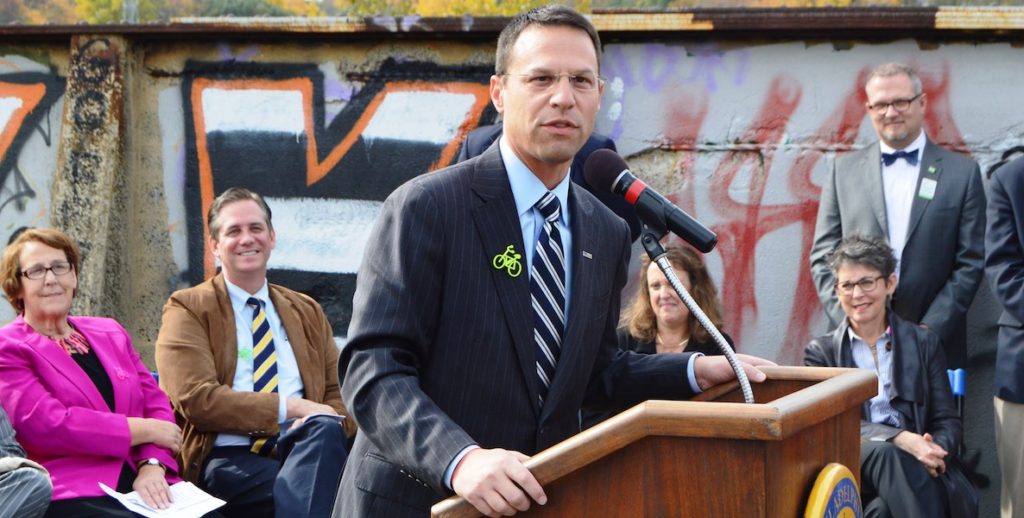
Trump’s exchange with Shapiro wasn’t an isolated incident, either. Let’s review: First, there was the White House’s failure to mention Jewish victims in a statement on Holocaust Remembrance Day, a deviation from every prior such message. (Prompting Bill Maher to wonder: How can you forget the Jews in a Holocaust statement? The answer was that they hadn’t…the White House later said it had been an intentional omission, out of respect to members of other groups who had also died.)
Then there was the press conference with Bibi Netanyahu where Trump was asked about the rise of anti-Semitic incidents and responded by talking about his Electoral College vote total and the fact that his daughter had converted to Judaism. And who can forget the Jewish reporter who, during a subsequent press conference, again tried to broach the subject to Trump,who told the reporter to sit back down —seeming to think the question had accused him of anti-Semitism, which it hadn’t. Doth the dude protest too much?
And Trump’s response to Shapiro wasn’t the first time he’d expressed the thought in public that maybe all these hate crimes were contrived acts of political theater. During the same press conference in which he insulted the Jewish reporter, another reporter teed it up for the president by again inviting him to do what every other president in recent history wouldn’t have to think twice about: Condemn acts of hate in no uncertain terms and urge all Americans to peacefully unite. Instead, this is what Trump said, in a barely coherent response:
Some of it is written by our opponents. You do know that? Do you understand that? You don’t think anybody would do a thing like that? Some of the signs you’ll see are not put up by the people that love or live Donald Trump. They’re put up by the other side, and you think it’s like playing it straight? No. But you have some of those signs, and some of that anger is caused by the other side. They’ll do signs, and they’ll do drawings that are inappropriate. It won’t be my people. It will be the people on the other side to anger people like you.
So, seriously, what’s up with Trump and the Jews? What we’re seeing just might be the perils of having a president who lacks a single core conviction, other than the perpetuation of his own brand. I doubt Donald Trump is classically anti-Semitic; he’s not reading The Protocols of the Elders of Zion. But in his zeal to achieve power, not only has he changed virtually every political position he once held—remember, not so long ago, he was a pro-choice Hillary Clinton donor!—he’s dog whistled to the bigots of the alt-right, whether it’s tweeting an image of a star of David with Hillary Clinton’s face superimposed on a pile of money, airing an ad warning of a shadowy cabal of bankers, or turning a good part of the West Wing over to alt-right pied piper Steve Bannon.
After all, guess who else is calling into question whether these hate crimes are actually happening? “President Trump, do you think it might be the Jews themselves making these calls to get sympathy to push their ethnic agenda?” none other than David Duke tweeted, referring to the bomb threats made to Jewish Community Centers.
“You know what we need?” Rabbi Rosenbloom said. “During the McCarthy era, a lawyer named Joseph Welch said, on live TV during the Army-McCarthy hearings, ‘At long last, Senator, have you no decency at all?’ It was a moral turning point. We need a moment like that. Donald Trump isn’t just president. He’s the moral leader of the western world and we’ve got to hold him to that standard.”
Shapiro’s phrase—“moral clarity”—kept reverberating after our conversation. In search of some, I called Rabbi Seymour Rosenbloom, the 72-year-old Rabbi Emeritus of Adath Jeshurun in Elkins Park. Rosenbloom is all about moral clarity, as a moving Daily News column by Helen Ubiñas made clear late last year, after Rosenbloom was expelled by the Rabbinical Assembly, the international association of conservative Rabbis, for officiating at an interfaith marriage. Rosenbloom has a booming voice and a touch of the rebel in him; if anyone could cut through the noise to the moral heart of these matters, I thought, he could.
“I don’t know what’s in President Trump’s heart, and I don’t care,” he said. “But it is not accidental that these acts are coincident with his presidency. He’s legitimizing racism and bigotry.”
Rosenbloom said Trump’s odd buck-passing and fingerpointing was sending dangerous signals…and that it was “indecent.” What a perfect word choice, I said, prompting Rosenbloom to pause. “You know what we need?” he said. “During the McCarthy era, a lawyer named Joseph Welch said, on live TV during the Army-McCarthy hearings, ‘At long last, Senator, have you no decency at all?’ It was a moral turning point. We need a moment like that. Donald Trump isn’t just president. He’s the moral leader of the western world and we’ve got to hold him to that standard.”
I recently read Erik Larson’s brilliant In The Garden of Beasts, which recreates Germany in the early thirties. I’ve been thinking of it lately because it was all the sensible moderates—me, in other words—who said, in effect, totalitarianism could never happen here…when saying otherwise might have made a difference. So, I asked Rosenbloom: What can we as individuals do now, on a daily basis?
“We can have conversations like this one,” he said. And we can hold up green shoots of hope, like the work of Philadelphia resident Tarek El-Messidi, who organized Muslims to raise over $130,000 to counteract the St. Louis vandalism, and who is now doing the same for Mount Carmel Cemetery here. “I just donated to a GoFundMe page to rebuild a mosque that was firebombed,” Rosenbloom said. “We need to do these kinds of things, to reach out to one another.”
And the worst thing we can do? “Remain silent, play the false equivalency game, and accept lies and the delegitimizing of hate crime complaints as the new normal.”
Header photo: Overturned headstones at Mt. Carmel, by Cara Levinson


